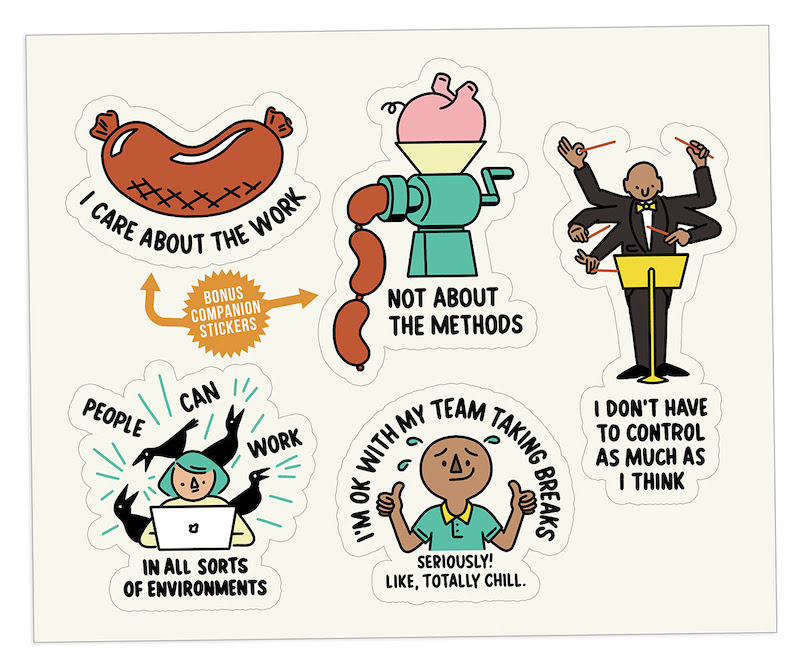Dear Andy & Emma,
How do I accept my team won’t always be working at work? I know they’re humans, not robots, but all the phone checking and breaks and goofing off is driving me crazy. They’re at work. They should be working…right?
Emma: I think this is one of the trickiest manager quandaries of all: Should I police how my team gets the work done?
Andy: Really? I think it’s so clear cut: No. The information I need is in the work. If it’s all getting done at quality, at scale, and on time — and no one is getting injured in the process — there’s not much room to criticize the process.
Emma: I don’t disagree! But I certainly didn’t wake up on my first day as a boss with that perspective. There’s just so much internal bias that burbles up when we witness different work styles. At one of my first jobs, I had a colleague who streamed Parks and Rec at her desk while she sat there typing. I remember being appalled. There was no way that could possibly be acceptable!
I think it takes practice not manage from that instinctive, reactionary place.
Andy: Okay yeah, the first time I saw a writer on my team using their second monitor as a TV, it did make my neck snap. But I really had to dig to find something wrong with it. Is there limited internet bandwidth? No. Is it bothering anyone else? No. So why do I care?
Clearly, neither of us work in, I don’t know, a smelting factory or something. There are work environments where the rules are tighter and for a real reason. For the rest of us, though, the feeling of that’s not work! stems from control. It can feel wacky in a really huge way to see a person doing things differently than how you do it. Me? I can’t work for crap with a TV show playing. But, a lot of managing and leadership is realizing what you actually need to control. I’ve found that it’s a lot less than I first thought.
Emma: There’s also a big trust component at play. I judge how my low-performers — and the people I just plain don’t like — choose to use their time much harsher than my rock stars.
Andy: Of course you do. You’re human. I do, too! They’re not rocks stars because of all the coffee breaks!
Emma: Case closed.
Andy: Listen, if the work isn’t getting done, or if someone’s work isn’t good enough, they are definitely going to get some involvement from me on their methods. Why? Because their current methods aren’t working. If I witness a kooky, convoluted process, I will share a streamlined approach. Hate that someone is always doing things at the last minute? I’ll set interim due dates. There are ways I can intervene in disastrous habits without dictating at-work behaviors.
Emma: The best interventions come in the form of curiosity. In a 1-on-1, I might say, “I’ve noticed over the past month you’ve been really running up against deadlines. Are there any barriers I can help remove?” This gentle mention might be enough to course correct. Or they might ask for help brainstorming how to battle procrastination. Or you might discover they are going through some Big Life Stuff that’s distracting them. Worst case scenario, you’ll have your first documented discussion that there is a problem that needs to be addressed.
Andy: You won’t know until you ask.

Three Truths About People and Their Work Habits
People take a lot of breaks
Emma: Like, a shocking amount. I can write for maybe 12–20 minutes at a time before I’m flitting off to something new. I’ve seen Andy plug away at one task for a solid 45 minutes, and people like my mom even longer, but even they have their limits. Take comfort that even in sleep mode, the brain is still churning through problems, solutions, and new ideas.
Andy: I know this sounds like a koan, but if you are looking for breaks all you will see are breaks. Look for the work, and you’ll see the work.
There’s no such thing as a universal work style
Andy: Trying to impose the One Right Way is short-hand for “I’m a micromanager.” And it can backfire. Now your team has to care about work and your opinion of how they sit in their chair, and what they listen to, and oh, have you noticed carbs make them kind of slumpy in the afternoon?
Emma: Lol, I dare you to give me feedback about how much spaghetti I eat for lunch.
What’s “normal” at work is based on our time in space
Andy: There was definitely a time when headphones were considered disruptive. Now they are standard office equipment.
Emma: Some people really do focus better to the sound of dialogue — the news, a TV show, a podcast, coffee-shop conversations. This is an absurd truth you just have to accept. A particle can also be wave.

Good Boss Achievement Stickers: Productivity Edition


